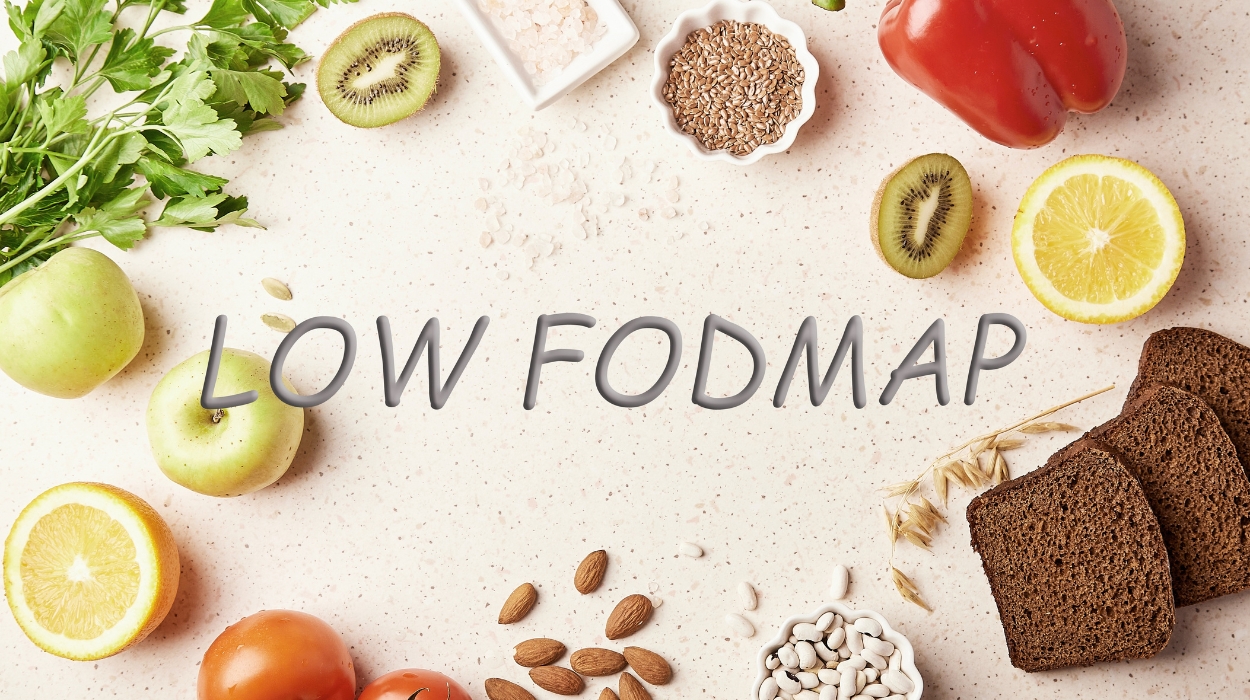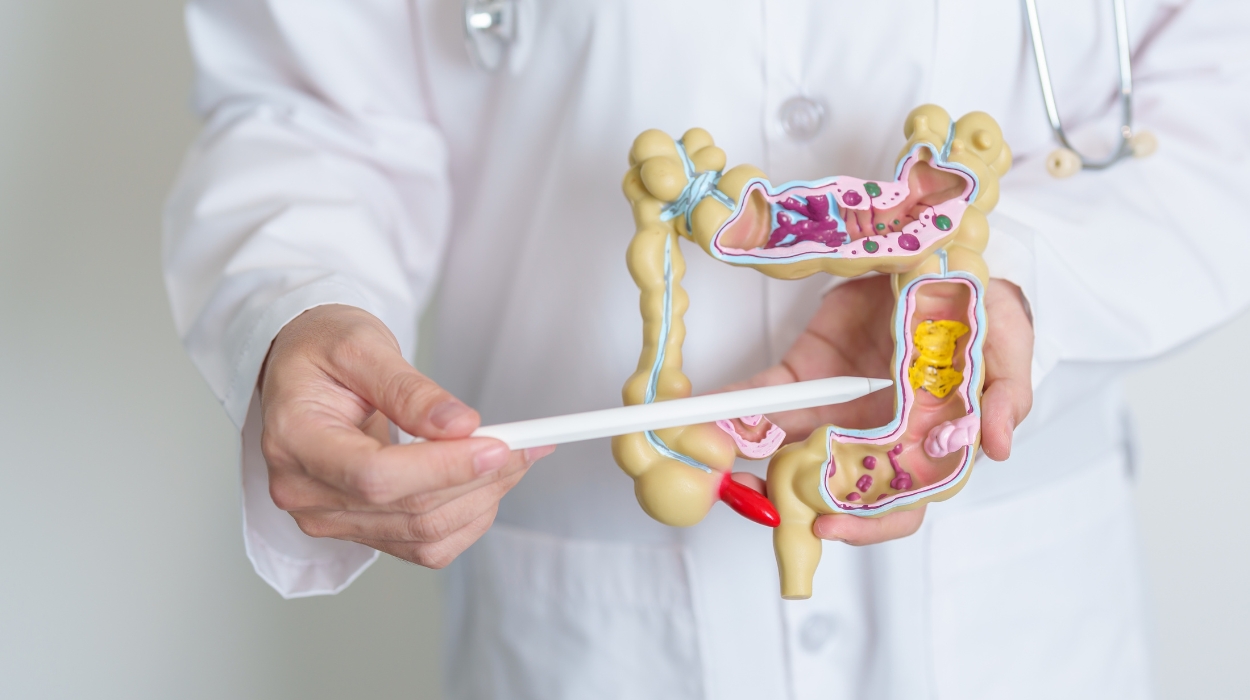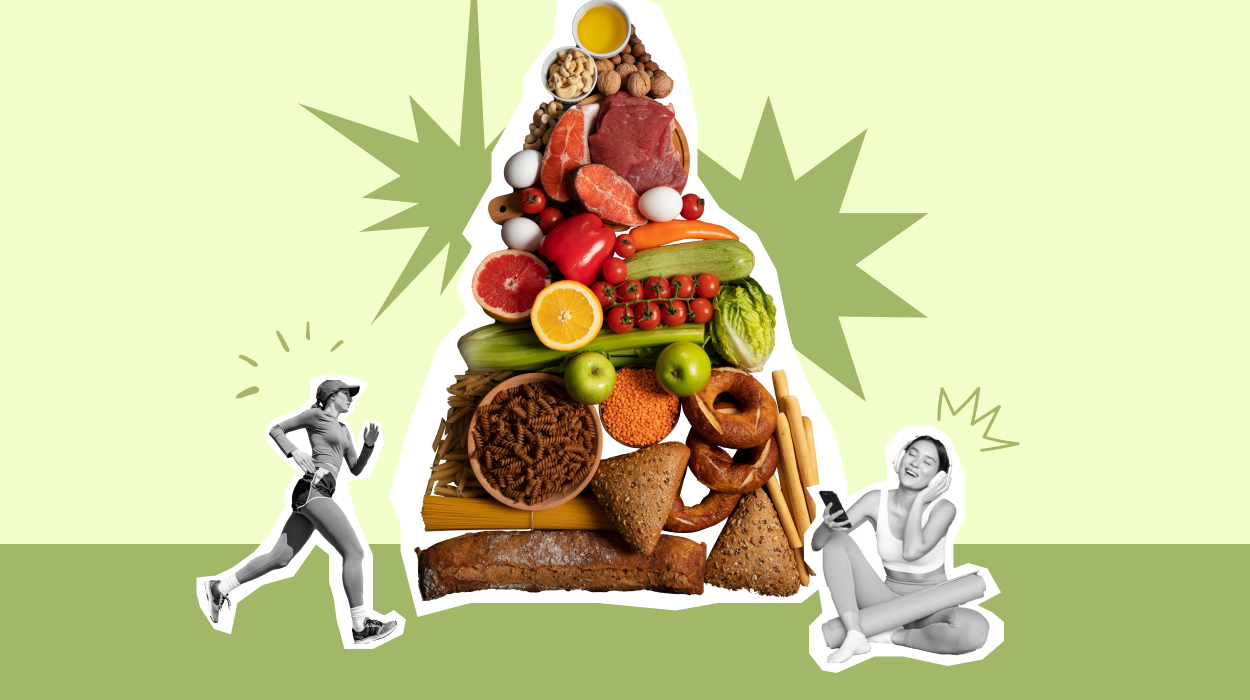While there are several diet plans, videos, etc., targeted at people trying to lose weight, they are not enough for many other people struggling to gain weight. Symptoms of a restrictive diet can lead to unintentional weight loss if you deal with irritable bowel syndrome (IBS).
Many people with IBS find it challenging to gain weight, especially with diarrhea as a common symptom, as their bodies cannot absorb the food’s nutrients. But fear not! With the proper lifestyle and diet, you can gain a healthy weight with IBS.
This article will focus on how to gain wider hips through exercise and diet.
IBS Weight Gain: How To Do?
- Nutrition
- Nutritious Carbohydrates
- High-Quality Proteins
- Eat Low FODMAP Foods
- Consume Drinks With High Calories
- Eat More Healthy Oils
- Drink Green Smoothies
- Eat Nuts, Seeds, Butter
- Eat More/Regular Meal Times
- Exercises
- Walking or swimming.
- Strength training
- Low-impact cardio exercises, yoga
- Lifestyle changes
- Have a regular meal pattern.
- Small and frequent meals give your gut time for digestion.
- Try to avoid eating late-night dinners.
- Sit down and chew your food correctly.
- Try de-stress therapies like meditation and music.
- Get enough quality sleep.
How To Gain Weight With IBS
IBS does not directly cause weight loss, but it may make it challenging to maintain or gain weight. It is crucial to maintain a healthy weight to prevent a variety of diseases related to being underweight or having weak bones. Adapting the food pattern to irritable bowel syndrome is the basis for a range of IBS treatments.
The primary recommendation for patients with mild and sporadic symptoms that do not impair quality of life is lifestyle and food change rather than specific pharmacologic medications.
Avoiding food triggers and consuming more readily digestible, nutrient-dense, high-calorie foods that encourage weight gain are necessary to achieve a healthy weight increase with IBS. Combining these approaches with a personalized care plan enables individuals with IBS to both gain weight and experience symptomatic improvement.
- Detox your body and reboot it with a proper diet and lifestyle for good weight gain.
- Ensure your diet provides you with all the nutrients you need for good health.
- Increase your calorie intake with foods that do not worsen your IBS symptoms.
- Get to the bottom of your IBS symptoms!
- Focus on building muscle instead of increasing fat content in the body.
- Do not overdo with sugar and fats to gain weight. This will cause serious health complications.
- Exclude gas-producing foods
- Start an empiric trial of a lactose-free diet if you have persistent abdominal bloating despite the exclusion of gas-producing foods
Nutrition
There are no fixed guidelines for increasing weight in IBS through diet. Finding the correct diet by eliminating and reintroducing certain foods can help you manage a healthy weight in IBS. Foods that can help an individual may cause severe digestive disturbances in others. Try to figure out your food allergies, tolerances and intolerances, and level for each food item before concluding your weight-loss meal plan.
Nutritious Carbohydrates
Carbohydrates are essential in the diet as they are the body’s primary energy source and are required to fuel the brain and nourish gut microbiota. They also contain B vitamins and many essential minerals; hence a healthy weight gain diet should include quality sources of carbohydrates that are easy to digest.
Unlike simple and refined carbohydrates, the carbohydrate sources that are less likely to trigger IBS symptoms should be gluten- and fructose-free, but also high in fiber foods. Examples are oats, rice, gluten-free pasta, quinoa, and buckwheat. In essence, choose carbs from a low FODMAP list.
High-Quality Proteins
Although it is sometimes overlooked, many high-protein food sources are high-calorie foods that can promote weight gain in a nutritious way. Protein helps build muscle mass, so stocking up on them can help you gain weight. Even smooth muscles that make the gastrointestinal tract function smoothly require good protein sources.
Getting enough protein helps provide the necessary calories and can prevent weight loss. The high-protein foods for those with IBS are seafood, eggs, fish, meat, lactose-free dairy products, chicken and turkey, seeds, and nuts.
Eat Low FODMAP Foods

When you have IBS and want to gain weight, it’s important not to exclude foods unnecessarily. FODMAP is an available diet that restricts certain carbohydrate-containing foods called Fermentable Oligo-, Di-, Monosaccharides, and Polyols (FODMAPs). A low FODMAP education starts with cutting FODMAPs out of the diet for six to eight weeks. After the symptoms go away, the person slowly adds fermentable carbohydrate-rich foods back into their diet to find out how they react to each one.
Low-FODMAP foods contain small amounts of fermentable carbs. Some low-FODMAP foods are greens, carrots, potatoes, green beans, squash, lettuce, blueberries, bananas, Lactose-free dairy, cane sugar, and brown sugar proteins (such as turkey, fish, eggs, and chicken), and High-FODMAP foods are short-chain carbohydrates that increase water volume in the bowel, quickly fermented by gut bacteria. This can lead to bloating, discomfort, and eventually abdominal pain in many people with IBS.
High-FODMAP foods are short-chain carbohydrates that increase water volume in the bowel, quickly fermented by gut bacteria. This can lead to bloating, discomfort, and eventually abdominal pain in many people with IBS. Some High-FODMAP foods, such as apples, blackberries, dairy products, wheat products, sausages, and legumes, should be restricted for IBS patients to avoid symptoms in the digestive system or not exacerbating.
Consume Drinks With High Calories
Add full cream or soy milk to increase the calories in tea and coffee.
Add More Healthy Oils To Your Diet
Fat sources are essential for gaining weight and contribute more calories than carbohydrates and proteins. Besides being a source of energy, fats are also required for muscle building.
If an IBS patient isn’t sensitive and can tolerate fats well, you can include 20-30% of your calories from fats and oils. They would increase calorie intake and help relieve IBS symptoms. They are extra virgin olive oil, nuts and nut butter, coconut oil, and avocado oil.
Drink Green Smoothies
Packed with lots of fruits and vegetables, smoothies are a great way to squeeze in the nutrients and calories you need to gain weight. Add milk, yogurt, or nut butter to add more energy. Your green smoothie that contains oils, seeds, fruits, and vegetables — all low-FODMAP foods are unlikely to trigger IBS symptoms. Always consume your smoothie slowly to keep your digestive system happy and avoid feeling too full.
Eat Nuts, Seeds, Butter
Seeds, and nuts such as macadamia, almonds, hazelnuts, walnuts, peanuts, and Brazil nuts — are packed with energy-rich nutrients and healthy fats. They are an excellent source of fiber and vitamins, making them a great choice for snacking. Try spreading nut butter on fruits, adding it to smoothies, or enjoying it straight from a spoon!
Eat More/Regular Meal Times
Enjoy meals at regular times, chew well, and eat slowly. You may find it easier to digest and tolerate smaller food portions than more significant portions.
Exercise
Patients with IBS should be told to do physical activity because it might help with their symptoms and is good for their health in general. It can also help build muscle and help you gain weight. Try walking, strength training (to build muscles), low-impact cardio exercises, yoga, or swimming. You can gain weight if you work out the right way.
Doesn’t Exercise Stimulate Symptoms?
Exercise can stimulate the gastrointestinal system and produce reactions. However, this doesn’t mean that all forms of exercise are harmful to IBS patients. Research shows that regular exercise can help with IBS symptoms.
Just like food, it’s essential to test out which physical activities result in aggravated symptoms, so you don’t end up eliminating all of them.
Lifestyle Changes
Discomfort from diarrhea and constipation can shape the way we eat. For instance, to prevent frequent bowel movements, patients may either eat two big meals and not eat for the rest of the day or decide to skip meals altogether because of abdominal pain. Intense exercise is not recommended as it draws blood away from the intestines, increasing inflammation in the gut and worsening symptoms.
Knowing how symptoms shape eating habits is vital in managing weight for IBS. Some other lifestyle moves are:
- Have a regular meal pattern.
- Small and frequent meals give your gut time for digestion.
- Try to avoid eating late-night dinners.
- Sit down and chew your food correctly.
- Try de-stress therapies like meditation and music.
- Get enough quality sleep.
What Is Irritable Bowel Syndrome?
Irritable Bowel Syndrome, or IBS, is one of the functional gastrointestinal disorders (FGDs). It is a functional disorder of the gastrointestinal tract characterized by chronic abdominal pain and altered bowel habits, that affect digestion and can make it difficult to gain weight. This disorder affects the lower GI tract, which includes the small intestine and colon (large intestine).
With IBS, the colon tends to contract more than usual, causing symptoms such as gas, stomach cramping & pain, and bloating. The symptoms can be triggered when you consume certain foods such as legumes, cruciferous vegetables, dairy products, cabbage, onion, fried and smoked food choices, and wheat products.
Why Is Gaining Weight With IBS Difficult?
When you have IBS, it’s hard to gain weight because your diet is so limited that you don’t get enough calories. When you eat certain foods that make you feel bad, like pain, gas, constipation, or diarrhea, you might want to avoid those foods or even skip meals to get rid of the bad feelings.
This makes it harder for your body to get the nutrients it needs. Especially dairy and wheat products, which many healthy people need as their main sources of calories, carbs, and protein. When people with IBS avoid these food groups, they have a big calorie deficit, which makes it hard to get enough calories to stay the same weight.
During IBS flare-ups, when the digestive system is more sensitive and uncomfortable, a person may dislike all foods. This is the main reason why people with IBS lose weight. Additionally with the altered bowel habits and diarrheas these patients often present.
Can IBS Cause Weight Gain?

People with gastrointestinal disorders often experience unusual weight changes as a side-effect of their condition. In addition, some people may present IBS with predominant constipation (one of the 4 subtypes of IBS) and changes in bowel function can include straining, having stools less often, having stools that are hard or lumpy, or feeling like the bowel is not emptying all the way. Also, some may feel like they can’t go to the bathroom because of a “blockage.” In addition, these symptoms are linked to diet and may be more prevalent in obese individuals due to overeating in response to decreased satiation signals. Alterations in the composition of the gut microbiota have been found in both obesity and IBS, suggesting a relationship[1] between the two conditions. In general terms, body weight gain can occur depending on a handful of factors involving diet, hormonal activity, lack of exercise, and more.
For example:
- People with IBS who experience constipation and abdominal pain may keep themselves from eating to alleviate symptoms. Alternatively, other people may find themselves constantly eating to suppress acid flare-ups. Mainly unconsciously, we eat comforting, easily digestible processed carbs that are more calorie-dense. They may skip eating vegetables, fruits, and beans.
- IBS is often linked to depression or anxiety, leading to overeating. Emotional eating usually occurs when someone feels stressed or upset, and food provides comfort.
- Constipation from IBS can be made worse by things like a bad diet, not drinking enough water, and not getting enough exercise. These same things can also cause weight gain, a slower metabolism, and too much body fat.
- In other cases, eating provides a different sensation that can mask the pain, physical discomfort, or psychological unease from IBS, leading people to eat continuously and avoid or limit exercise.
- Another reason is bloating. Two significant types of bloating can happen in IBS: above the belly button and below the belly button, and some people tend to experience both types of bloating.
Conclusion
IBS does not directly cause weight loss, but it might make it difficult to maintain a healthy weight or gain weight. It is essential to maintain a healthy weight to avoid contracting numerous ailments associated with being underweight or having weak bones. Adapting the diet pattern to IBS is the basis for a variety of treatment methods for irritable bowel syndrome.
Achieving a healthy weight gain with IBS requires avoiding food triggers and consuming more easily digestible, nutrient-dense, high-calorie foods that promote weight gain. Combining these measures with a personalized care plan enables people with IBS to concurrently gain weight and improve their symptoms.
Frequently Asked Questions
Although the exact cause of IBS is unknown, the common problems in those with IBS are stress, Early life events such as physical or sexual abuse, Mental disorders like depression and anxiety, Overgrowth of bacteria in the small intestine, and Food intolerances or sensitivities.
IBS can result in weight loss or gain in specific individuals. Some people may experience significant abdominal cramping and pain that may cause them to eat fewer calories than usual. Others may stick to certain foods that contain more calories than needed.
Diarrhea, one of the main symptoms of IBS, prevents digestion and absorption, resulting in a large amount of calorie loss and leading to weight loss. Also, those with IBS cannot eat many foods due to their trigger effects. Preferring other foods rather than foods that may trigger IBS symptoms may be beneficial to gain weight.
IBS itself does not cause weight loss. Weight loss may occur due to eating less to avoid IBS symptoms.
Yes! Many people think this is not possible as it is more food restriction. The low FODMAP diet provides many food choices, allowing you to gain weight as needed. It also addresses your IBS symptoms which is the initial cause of your changing your diet and losing weight in the first place.
Stick to unrefined cold-pressed oils like coconut oil, gingelly oil, etc. These oils are not processed and extracted from seeds by natural methods.
Loss or gain of appetite is not a direct symptom of IBS. However, stomach pain and factors associated with IBS, such as stress, may affect your desire to eat.
Not necessarily. IBS is not the same as malabsorption syndrome, though there can be similar symptoms. Foods high in FODMAPs are generally absorbed poorly. However, for those with IBS, symptoms may develop from eating such foods, leading to eating less to avoid symptoms. This can result in less caloric intake.
 Expert's opinion
Expert's opinion
